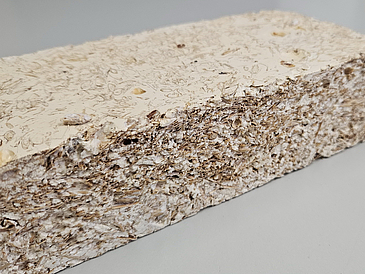It is easy to spot in mold with the naked eye: a fine mycelial network, which mostly grows hidden in the ground or in biomass. Mycelium possesses properties that can be very useful in avoiding environmentally harmful packaging waste. Scientists from the University of Göttingen and the University of Bremen, as well as from the BIBA – Bremer Institut für Produktion und Logistik, are now researching new biodegradable mycelium composite materials and their use in creating biodegradable packaging. They are developing adapted production methods that keep the entire product life cycle in mind and use artificial intelligence for promising material combinations.
Mycelium, with its thread-like hyphae, has the potential to transform biomass into a high-performance composite material. The goal of the project “Integrated material, process and product development methodology for product life-cycle optimized mycelium-based packaging products as part of circular economy” (MycelCycle)” is to develop an integrated methodology for the material composition, production process, and product development of mycelium composite materials. This methodology will address the current challenges of the product lifecycle in terms of material selection, material preparation, recycling, and reuse.
Local resources and closed material cycles
The focus is specifically on the use of locally available organic residues and waste materials to enable short transport routes and sustainable production. These raw materials are sterilized in an energy-saving way, combined, and processed with consistent quality, so that production, use, and recycling are possible at the highest quality. Above all, the best possible material cycle should be guaranteed.
Innovative application: Mycelium for insulated coolers
A concrete example of the use of mycelium-based materials is cooler boxes for shipping. For this purpose, the research project aims to implement a closed material cycle. It also examines the secondary use of the material as shredded bulk material for shipping packaging and even as base material for further mycelium cooler boxes.
Utilizing artificial intelligence
Another highlight of this project is the use of artificial intelligence (AI) to identify optimal starting material combinations and optimize process control. The use of the latest AI technologies ensures that the materials can be made efficiently and sustainably.
Sustainable solutions for a growing challenge
Packaging waste in Germany has more than doubled in the past thirty years, and the trend is ongoing. “Legal regulations also demand changes towards environmentally and climate-friendly products and processes,” says BIBA’s director and project initiator Professor Michael Freitag. “The use of new, ecologically safe materials and corresponding processes are increasingly becoming a success factor. The research in the ‘MycelCycle’ project with its holistic approach is intended to contribute to more sustainable economic activity and an efficient and effective circular economy.”
Transfer and dialogue
Another project goal is to share and disseminate the knowledge gained, exchange ideas constructively with all stakeholders from research and practice, and thus receive new impulses. In this way, new opportunities for the development of mycelium products for various industries should also be recognized.
About MycelCycle:
The 4-year research project “MycelCycle” (Integrated material, process and product development methodology for product life-cycle optimised mycelium-based packaging products as part of circular economy) will receive 1.26 million euros in funding from the VolkswagenStiftung. Research partners are the Department of Molecular Wood Biotechnology and Technical Mycology at the Faculty of Forest Sciences and Forest Ecology of the University of Göttingen, the Institute for Integrated Product Development (BIK) within the Faculty of Production Engineering - Mechanical Engineering and Process Engineering of the University of Bremen and the BIBA - Bremer Institut für Produktion und Logistik at the University of Bremen.
Further information:
www.uni-goettingen.de/de/67051.html
Contact:
Prof. Dr.-Ing. Michael Freitag
BIBA - Bremer Institut für Produktion und Logistik
Phone: +49 421 218-50 002
Email: freprotect me ?!biba.uni-bremenprotect me ?!.de
Prof. Dr.-Ing. Jan-Hendrik Ohlendorf
Institute for Integrated Product Development (BIK)
Phone: +49 421 218-64 871
Email: johlendorfprotect me ?!uni-bremenprotect me ?!.de

